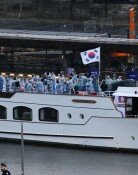Does the Democratic Party Have a Vision?
Does the Democratic Party Have a Vision?
Posted September. 02, 2010 13:27,
The Dong-A Ilbo asked the ruling Grand National Party Tuesday if it has a vision of hope to give to the people. Dong-A also wants to ask what vision the main opposition Democratic Party can present to the people to gain their favor.
Democratic Party floor leader Park Jie-won said Wednesday, We will categorically oppose the four-river restoration project in the upcoming regular parliamentary session. He also demanded that the government reduce the period, budget and the scale of reservoir construction and dredging work to those carried out under the previous government. When our demands are met, the projects budget will pass the National Assembly before the legal deadline, Park added, implying that the budget will not pass without a drastic reduction in the project.
The four-river project is fundamentally water preservation works to revive rivers and prevent flooding. The previous Kim Dae-jung and Roh Moo-hyun administrations planned works much larger in scale. A comprehensive plan to prevent water damage worth 24 trillion won (20 billion U.S. dollars) was devised in December 1999 under Kim. Roh came up with a similar plan worth 42.8 trillion won (36 billion dollars) in April 2003 and proposed a disaster prevention system costing a combined 87.4 trillion won (73.8 billion dollars) in July 2007. Considering the tremendous budget spent on recovery from flood damage, the four-river project costs just 22 trillion won (18.6 billion dollars) and needs to be carried out.
Certain mayors and governors belonging to the Democratic Party opposed the project shortly after the June 2 local elections, but shifted their stances after listening to the opinions of their constituents and grasping the situations in their areas. Despite this, the party continues to undermine the project aimed at turning the countrys four major rivers into sustainable water resources through propaganda ignoring Koreas technological level in civil engineering. A decline in the budget will also increase the long-term cost of the project.
The Democratic Party is virtually hindering the arrest of its lawmaker Kang Sung-jong, who allegedly embezzled eight billion won (6.7 million dollars), by asking for an investigation without detention. The party refuses to apply the moral standards to its own lawmakers that it did on Cabinet minster-designates at parliamentary confirmation hearings.
The opposition party is apparently indulging in a sense of satisfaction stemming from its victory in the local elections and the withdrawal of three Cabinet minster-nominees at confirmation hearings. If it sticks to the outdated strategy that opposing the ruling party will allow the Democratic Party to take power, it will lose a golden opportunity again. When it presents a vision that offers hopes to the people and shows its ability to be a ruling party with alternatives, a change in government will be possible and Korean democracy will firmly take root.







